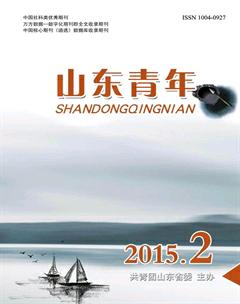OntheEssentialIngredientsofModernCulturalSyllabus
王丹邱+刘英波
Abstract:lntegratingculturallearningwithinEnglishteachinghasgraduallybeenacceptedasacommonpracticeintheEnglishlanguageteachingclassrooms.Basedontheinseparablerelationshipbetweenlanguageandculturethisessayanalyzestheessentialingredientsofmodernculturalsyllabusandbelievesthatlanguageteachershavetofollowaculturalsyllabusspecifiedwithanintroduction,asetofteachingmaterialsandacomprehensiveglossary.
Keywords:culture;culturalstudies;syllabus
Ⅰ.Introduction
Formabout40yearsago,culturestartedtobeconsideredinseparablefromtheteachingoflanguages.Scholarsbelievethattheculturalcomponentoflanguageteachingcametobeseenasthepragmaticfunctionsandnotionsexpressedthroughlanguageineverydaywaysofspeakingandaction.Thisessaymainlydiscussesthebasicingredientsofmodernculturalstudiessyllabus.
Ⅱ.Theessentialingredientsofmodernculturalstudiessyllabus
A.Cultureandculturalstudies
Culturemeansdifferentthingstodifferentpeople.Culturehasbeendefinedas"alistoffacts"or"ahodyoffacts"associatedwithasociety.Thus,culturalstudiesisonlyanexerciseofcollectinginformationconcerningthebackgroundinformationsuchas,geography,history,industry,economy,tradition,religion,achievementlikeworksofart,literature,architecture…andmanyothersfacts.Mostofthesefactscanbefoundspecifiedclearlyinthehooksavailableinlibrariesforthelearners.
B.Theessentialingredientsofmodernculturalstudiessyllabus
Syllabusis"aspecificationofwhatistobetaughtinalanguageprogrammeandtheotherinwhichitistobefaught."Modernculturalstudiessyllabusmainlyconcernswiththestudyofthetargetculture.Culturalsyllabuscontainsthreemainingredients:aninfroduction,asetofteachingmaterials,acomprehensiveglossary.
1.Anintroduction
Objectivesoraims,theprinciplesonwhichthesyllabusisbasedandthepotentiallearnergroupareusuallydescribedexplicitly.Theaimofamodernculturalstudiessyllabusistowidenstudents'culturalhorizonsanddeveloptheirinter-culturalawareness.Theprincipleofconstructingthesyllabusisfocusedontheskills,aimingatthestudent'sacquisitionofknowledgeandwillingnesstounderstanddifferentcultures.Theskills,asDanovalistedinherculturalsyllabus,are"criticalreadingandlisteningskills;comparingandcontrastingskills,ethnographicskillsandresearchskills".
Inthispartthelevelofthepotentiallearnershouldberegulatedbecauseitconcernswiththeselectionofteachingmaterialsandthepossibilitytocarryoutsometaskandactivitiesintheclassroom.
2.Asetofteachingmaterials
Thisisthemostimportantandessentialpartinaculturalstudiessyllabus,sinceitspecifiestheselectionandprogressionoftheteachingmaterials.Oneimportantteachingmaterialisthetextbook,whichshouldcontainawiderangeoftargetculture,sourcecultureandinternationalculture.Sothatitmay"raiselearners'awarenessofinterculturalissuesandenablethemtocommunicateeffectivelyandappropriatelyinavarietyofcommunicativecontexts."Thetextbookshouldcoversomeorallofthefollowingaspects:socialidentityandsocialgroups;socialinteraction;beliefandbehaviour;socialandpoliticalinstitutions;socializationandthelife,cycle;nationalhistory;nationalgeography;stereotypesandnationalidentity".Stereotypesmaybethestarting-pointinthetextbook.Because,learnersalwaysconsiderthemselvesasexpertsinthisarea,itcreatesinterest,andthusbecomesamotivatingfactor.Andtheotheraspectsmaycomeafterit.endprint
WhileNunanarguesthatnoneofthegiventextbookisenoughtomeetthevariousneedsofthelearnerintheclassroom.Supplementarymaterialsshouldbeincluded.Somesuggeststhatpictures,photos,diagrams,forms,chartsshouldalsobeincluded,sincetheyareeasilyunderstoodandcanstimulatethelearner'sreflectiononthetargetculture.Thematerialmaybeasvariedastypesofclassesandagegroups.
3.Acomprehensiveglossary
Thevocabularyintheglossaryinthesyllabusmustbe,thenewwords,keyexpressionsandimportantphrasesappearingintheteachingmaterials.Theprincipleofselectingandgradingthesewordcouldbethefrequencyofthewordsappearinginlearners'everydaylifeortheneedsofthestudents.Theglossarypreparesteachersespeciallylearnerwithwhatwillbereadortalkedinacertaintext,andalsoprovidesadditionalwordsandphrasesrelatedtothetopic;therefore,whenstudentscommunicate,theycanhaveaccesstotherelevantwordsorphrases.Asaresult,theybuilduptheirvocabularyintheparticularfieldofculture.
Since,therearedifferentdefinitionstosyllabus,culturalstudiessyllabusmayhavesomeotheringredientssuchasteachers'role,timeschedule,evaluationeventhemethodsandprocedures.Nomatterwhatthedefinitionofasyllabusis,culturalstudiessyllabusmustbeplannedcarefullyandspecifiedexplicitlybecauseitisapublicdocumentandmustsurvivethescrutinyofteachers,studentsandrelevantauthorities.Whereas,itshouldopentorevisionrespondingtothefeedbackofallconcerningaudience.
Ⅲ.Conclusion
Raisingculturalawarenessandasenseofcross-culturalunderstandingmostlyremainsthe'hiddencurriculum'oflanguageteaching.InordertointegrateculturalstudieswiththeELTcurriculumteachersshouldcreateapositiveclassroomclimate,buildupresourcesfortheirteaching,andcarrytheresponsibilitytoacknowledgethecloserelationshipbetweenacquiringalinguisticandaculturalcompetenceintheEnglishfeachingclassroom.
[Bibliography]
[1]Danova,R.(1999)"Branchingout--aculturalstudiessyllabus."IATEFLIssues.April-May.
[2]Nunan,D.(1999)SyllabusDesign.Oxford:OUP.endprint

